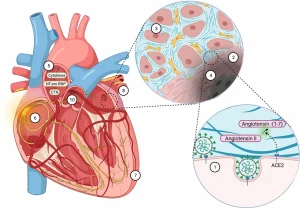The COVID-19 disease is a contagious respiratory disease caused by severe acute respiratory syndrome coronavirus 2 (SARS-CoV-2). The first known case was identified in December 2019. Over the past two years, more than 269 million people have been infected with 5.3 million died worldwide. Although COVID-19 is commonly recognized as a respiratory disease, it does have complications surrounding the heart in some patients. Some COVID-19 vaccines have also been found to have cardiac side effects. This article will dive into the cardiac, or somewhat unknown side effect of COVID-19 infection and vaccination.
General Symptoms of COVID-19
Get tested and consult your GP immediately if you have the following symptoms.
Most Common Symptoms
- Fever
- Cough
- Tiredness
- Shortness of breath
- Loss of taste and smell
Less Common Symptoms
- Sore throat
- Headache
- Aches and pains
- Diarrhoea
- Rash on skin
- Red and irritated eyes
Cardiac Complications of COVID-19 Infection
Patients with COVID-19 infection can present with a wide variety of cardiac complications, including myocardial injury (heart infarct), myocarditis (inflammation of heart muscle), heart failure, cardiogenic shock, and cardiac arryhthmia (irregular heart rhythms).
Common Symptoms Include:
- Shortness of breath
- Chest pain
- Nausea and vomiting
- Tiredness
- Ankle oedema

Figure 1: COVID-19 and the cardiovascular system
How Common is it?
Previous viral illnesses, including Middle East respiratory syndrome coronavirus (MERS-CoV), have been associated with similar cardiac complications. Current study shows that myocardial injury occurs in 7–17% of patients hospitalised with COVID-19 and 22–31% of those admitted to the intensive care unit (ICU).
Recent studies have also found that people with pre-existing cardiovascular diseases may be associated with more severe COVID-19 infection.
Diagnosis
- Blood troponin level: increased troponin level indicate infarction
- Electrocardiogram (ECG): most common diagnostic approach towards patients with suspected heart disease
- Cardiac imaging: echocardiogram and/or cardiovascular magnetic resonance
Treatment
Cardiac complications from COVID-19 infection would generally be treated separately on top of the respiratory symptoms. Medications must be tailored so that they won’t overload the patient’s liver and kidneys. Inform your doctor with all symptoms you may have and ask for proper medical advice.
Cardiac Complications of COVID-19 vaccine
Pericarditis is the inflammation of heart membrane, whereas myocarditis is the inflammation of heart muscle.
A small increased risk of pericarditis and/or myocarditis has been observed in people who have received an mRNA COVID-19 vaccine, including Comirnaty (Pfizer-BioNTech) and Spikevax (Moderna), compared to unvaccinated people. The incidence rate is around 2-3 per 100,000 doses administered.
Cases of Cardiac Complication Reported have Occurred:
- After mRNA COVID-19 vaccination, especially in male with age less than 30
- Usually within a week of vaccination
- Usually within a week of vaccination
Common Symptoms:
- Chest pain
- Shortness of breath
- Feelings of a fast-beating or pounding heart
Call ambulance immediately if you have the above symptoms.
Rounding Off
It’s important to note that COVID-19 itself is associated with a substantially higher risk of myocarditis and other cardiac complications compared to vaccination. Thus, despite the minor risk, we should still get COVID-19 vaccination as soon as we are offered.
For patient with recent myocarditis or pericarditis, acute rheumatic fever, and acute decompensated heart failure, consult your GP or cardiologist to decide on the best timing of getting the COVID-19 vaccine. Additional precautions are generally recommended.
